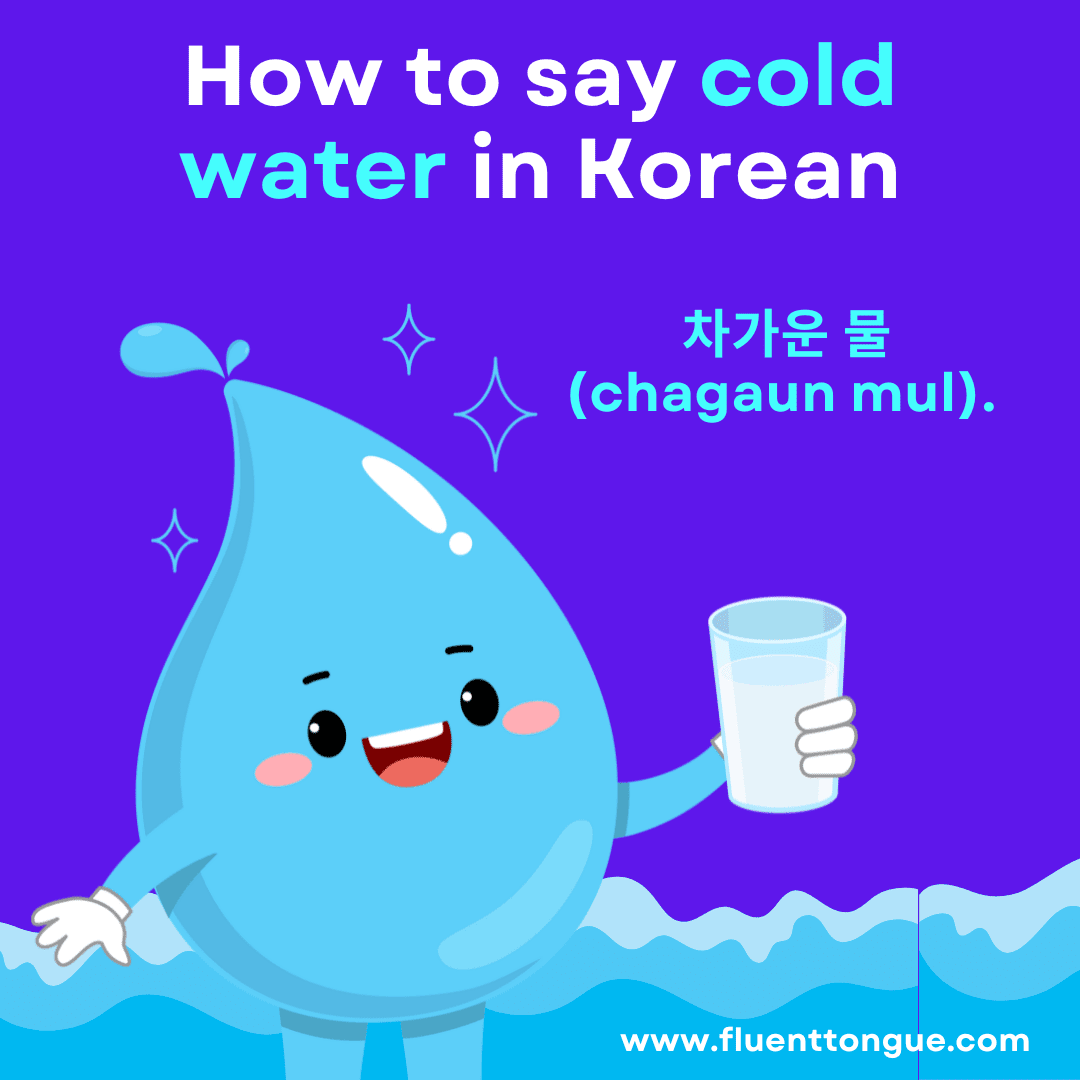Feeling thirsty and wanting to say “Please give me some water”/ “I want water in Korean”?at a friend’s house or to a family member.
But first, can you tell me how to say water in Korean?
Well, now you do
In This post, you will learn how to say water in Korean, translate Different temperatures and types of Water,popular Korean water brands, and how to ask and ordering water in Korean restaurants and 80+ Related Words and Phrases …
All right world, it’s time to dive in (to the core)
Table of Contents
How to say “Water” in Korean|mul in Korean

The Korean word for water is 물 (mul). it is pronounced as just a syllable word and it is pronounced as mul in Korean language.
Another building block that means water is 수 (su). It is based on the Chinese character for water, 水.
Be careful, if you want to use the word “water” by itself, you must use the word 물 (mul).
If you want to write mul in Korean alphabet (hangul), just write three characters such as mium, u and the last character.
Then you need to combine all these to make the one syllable “mul,” which means “water” in Korean.
Example
A glass of mineral water, please.
광천수 한 잔 주세요.
Is the water here safe to drink?
여기 물은 마셔도 안전한가요?
They cut my water off.
그들이 내 수돗물을 끊어 버렸어.
I’m dying for a glass of water.
물 한 잔 마시고 싶어 죽겠어.
What’s the depth of the water here?
여기는 물의 깊이가 얼마인가요?
Oil does not mix with water.
기름은 물과 섞이지 않는다.
In hot weather, drink plenty of water.
더운 날씨에는 물을 충분히 마셔라
A plastic bag was floating in the water.
물에 비닐봉지 하나가 떠 있었다.
The bathroom floor was running with water.
욕실 바닥에는 물이 흥건했다.
Different Temperature of Water in Korean
You just have learned how to say water in Korean.
but sometimes people like to drink hot water in the winter season and cold water in hot weather.
How would you say cold water or hot water in Korean then?
Here’s how
How to say Cold water in Korean

Cold water in Korean is 차가운 물(chagaun mul). It came from two words 차가운(chagaun) means “cold” and 물 (mul) means “water” in Korean.
Example
Is this cold water?
이거 차가운 물이야?
You have to rinse the noodles in cold water.
그거 소면 찬물에 헹궈야 돼요.
I don’t like washing my hair with cold water.
제가 차가운 물로 머리를 감는 걸 싫어해서.
I’m going to soak the rice cakes in cold water.
그리고 떡을 물에 담가서 불릴 거고요
I always shower with cold water.
저는 찬물로 샤워를 합니다.
I have to wash my hair in cold water.
찬물로 머리를 감아야 해요.
How to say Hot water in Korean

Hot water in Korean Is 뜨거운물. It came from two words 뜨거운 means “hot” and 물 (mul) means “water”.
Example
This is hot water, right?
이거 뜨거운 물이 거죠?
Do you have hot water?
뜨거운 물 있나요?
I put hot water in the ramen.
라면에 뜨거운 물을 넣었습니다
Don’t wash your hair with hot water.
뜨거운 물로 머리를 감으면 안 돼요.
Where is the hot water?
뜨거운 물이 어디 있지?
Do you want some hot water?
따뜻한 물 줄까?
How do we make hot water?
뜨거운 물 어떻게 만들어?
Is it hot water? – Yes it is
이거 끓인 거 맞아? – 끓인 물이야.
How to order /Ask for water in Korean?

Great job. you’ve learned how to say “water” in Korean,
So what’s next
If you want to ask questions like How can I ask for a glass or bottle of water in Korean in a restaurant or at a friend’s house or with your loved ones?
You would say it like this
Give me a cup of water, please.
물 한 잔 주세요 (mul han jan juseyo)
Can I have some water?
물 좀 주시겠어요?mul jom jusigessoyo
Asking for cold water in Korean

If you want to ask please give me cold water in Korean , you can just say the expression 차가운 물 주세요(chagaun mul juseyo) where 차가운 물 means “cold water “and 주세요 means “please give me”
Example
Please give me cold water
차가운 물 주세요(chagaun mul juseyo)
Can I have some cold water? (polite)
찬물 좀 주시겠어요?
chanmul jom jusigessoyo
Can I have some cold water?(causal)
찬물 좀 줄래? (Casual)
chan-mul jom jul-lae?
Asking for hot water in Korean

If you want to ask please give me cold water in Korean , you can just say the expression 뜨거운물 주세요(chagaun mul juseyo) where 뜨거운물 means “cold water “and 주세요 means “please give me “
Example
Please give me hot water
뜨거운물 주세요
Can I have some hot water? (polite)
뜨거운물 좀 주시겠어요?
Can I have some hot water?(causal)
뜨거운물 좀 줄래? (Casual)
Do you want water in Korean?
If you want to ask someone whether they need water or not like Do you want water
Then you can just say 물 드릴까요?mul deurilkkayo?
Do you want water?
물 드릴까요?mul deurilkkayo?
Yes, i am thirsty.
네, 목이 마릅니다- ne, mog-i maleubnida
No, i am not thirsty
아니요, 목이 마르지 않아요.
aniyo mogi mareuji anayo
Different Types of Water in Korean
Here’s how to describe different types of water in Korean like how to say cold water and hot water in Korean.
How to say Clear Water in Korean

맑은물 (mal-geun-mul) means Clear Water in Korean. You can use this word while talking about looking at the ocean, sea, lake, or river water.
But if you talking about drinking water, Korean like to use the word 깨끗한물(ggae-ggeut-han-mul) which literally means “clean water”
How to say Tap water in Korean

The Korean word for tap water is 수돗물 (sudotmul) where 수돗(sudot) means “a tap” and “mul” in Korean is water.
How do you say Seawater in Korean?

“seawater” in Korean is translated as 바닷물 (badanmul). It comes from the words which is means 바다 (bada) means “ocean” and mul means “water” in Korean.
What is Mineral water” in Korean

“mineral water” in Korean is translated as 생수 (saengsu).
Did you notice that it doesn’t have the word 물 (mul) in it? But it uses the word 수 (su) which is another word for water in Korean language.
Korean vocabulary Words with water 물 (mul) in Korean

- Tears-눈물nunmul
- Underwater-물속(mulsog)
- Fish- 물고기(mulkkogi)
- Wet tissue-물티슈multisyu
- salt water-바닷물badanmul
- flood tide- 밀물milmul
- Cold Noodles with soup- 물냉면(mulraengmyon)
- swimming goggles-물안경murangyong
- Broth-국물gungmul
Water and other common adjectives
- Cook-요리하다
- boil -끓이다.
- Rinse-헹구다
- Soak-담그다
- Drown-익사하다
- Wash-씻다
- Wet-젖다
- Bathe-세척하다
- Flush-붉어지다
- Shower-샤워실
- Overflow-넘치다
- sprinkle-뿌리다
Korean word for Water and weather geography
- Ocean- 바다
- Rain-비
- Beach-해변
- Bay-만
- River-강
- Waterfall-폭포
- Pond-연못-
- Glacier-
- Rainwater-빗물
- Snow-눈
- Cloud-구름
- Water pollution-수질 오염
- Lake-호수
- Fountain- 분수
- Flood-홍수
- ebb-썰물
Korean vocabulary for Water in the home
- swimming pool-수영장
- Septic tank-정화조
- Kitchen sink-주방 싱크대
- Hot water tank-온수탱크
- water purifier-정수기
- Water heater-온수기
- Basin-세면대
- plumbing-배관
What are some brands of Korean water?
Image source: statista.-Most used bottled water brands in Korea
Korea adores its branded waters.
In fact, you’ll find more than 20 different water brands in each superstore, with prices ranging from 500 won to 2000 won per bottle. I
Different drinking water brands with varying prices and general quality are available in South Korea.
The most well-known brand in South Korea is Jeju Samdasoo, which is the only water made from volcanic bedrock.
Bongpyeong Spring Water and Blue from E-mart are the least expensive brands. Each 2-liter bottle costs around 470 won.
A very brief list of the most well-known bottled water brands from Korea is provided below.
- Jeju Samdasoo (제주삼다수)
- Nongshim Baeksansu (농심 백산수)
- Lotte Icis
- Evian
- Bongpyeong Spring Water
- Blue from E-mart.
It’s crucial to remember that everyone has their own tastes even though these brands have been listed in a top-five order based on pricing, accessibility, and quality.
Even though getting a water purifying dispenser will help you save money, purchasing bottled water will be more practical.
Your decision!
How to Remember the Word “Water” in Korean?
To remember the word “water” in Korean, you can use the mnemonic “mul,” which sounds similar to the English word “mule.” This can help you associate it with the Korean word for water, “물” (mul).
To remember Korean vocabulary related to water easily, utilize techniques such as mnemonic associations, breaking down words, learning in context, practicing with flashcards, using multimedia resources, applying words in daily life, and grouping words by categories.
These methods enhance understanding and retention, making it simpler to remember Korean vocabulary.
Here’s how I did it.
Anki Isn’t The Only Game In Town. watch a drama
Did you know you can do a mini-series and master how to say water in Korean language?
Well, what could be better than that?
Here is how Koreans do it all the time (now you can do it too!!!)
Use flashcards and Test
Maybe drama is not your thing. What about flashcards?
I know it’s an old thing(you might be using Anki too)
But When it comes to mastering Korean vocabulary, you will never regret using these fellas.
Here is the list
https://quizlet.com/463566524/Korean-water-flash-cards/
https://quizlet.com/519764674/bodies-of-water-Korean-flash-cards/
Other Online Resources
We live in the era of the 20th century.
And I bet you love to surf (well, who doesn’t?)
The internet is full of free stuff and language resources that you haven’t explored yet. Here is what I found when I was learning to say water in Korean
Here is a list (I hope it might help you)
https://languagedrops.com/word/en/english/Korean/translate/water/
https://www.learnwitholiver.com/Korean/translate-sentence-1278
Conclusion
Voila! you now know how to say water in Korean, how to ask for it and a few other vocabulary words, besides!
I hope the Korean words listed in this article will help you to use the word mul in Korean in everyday life conversations.
So, it’s time to go out there and greet your Korean friends and have some conversation about water
Don’t know how to start a conversation? Check out these free Korean lessons on basic Korean greetings which will help you get started
How many words have you heard related to water that we don’t include in this post?
We challenge you to write them in Korean in the comment below.
We can’t wait to hear from you
